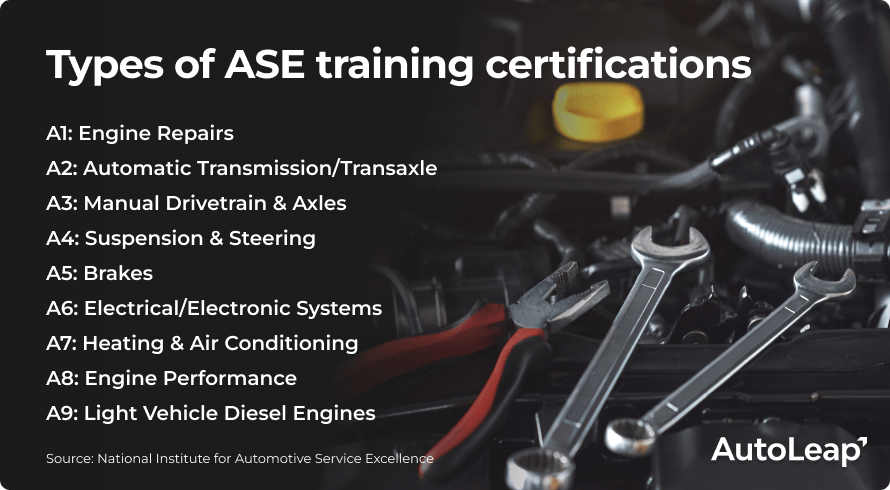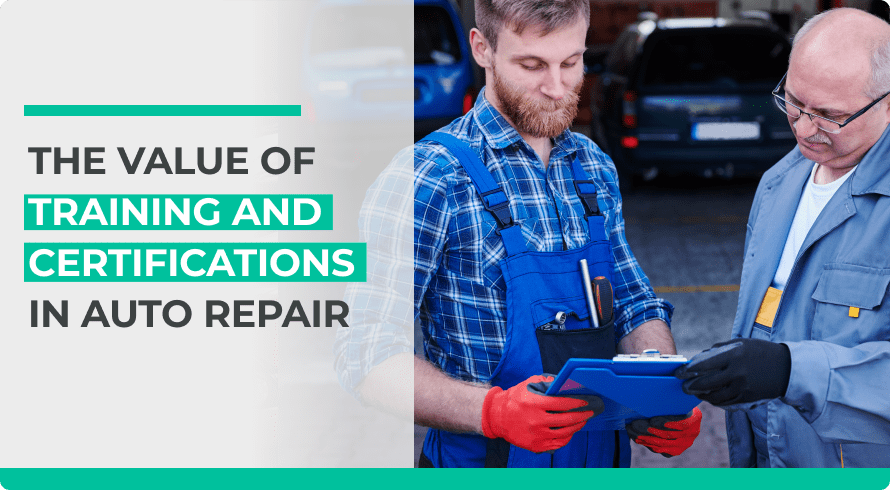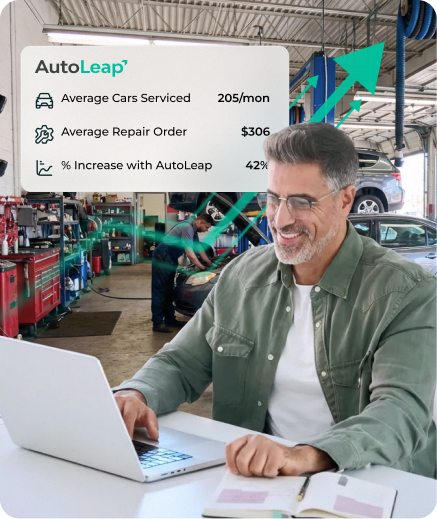The auto repair industry relies on competent and educated professionals. Obtaining auto mechanic certifications can foster trust with your customers and instill confidence in your employees. Additionally, these certifications keep mechanics and shop owners well-informed about the latest advancements in technology and tools within the industry.
Getting your auto mechanic certifications also provides valuable networking opportunities with fellow professionals, allowing for mutual learning and growth. But most importantly, these certifications help you offer more value to your customers.
In this new age of complex new vehicles, let’s explore why your mechanics need certifications and how much it can cost you.
Understanding the evolving automotive aftermarket
The automotive industry is dynamic. It has undergone significant changes in the past 20 years. With regular changes and updates to technology, it becomes essential to keep up with the changing times.
The increasing complexity of modern vehicles presents significant challenges for shop owners in the automobile industry. This complexity arises from advanced technologies and features aimed at enhancing safety, performance, and comfort. Specifically, some shifts from the past few years include:

1. Advanced electronics and computer systems
Modern vehicles feature sophisticated electronics and computer systems that control various functions, such as engine performance, emissions, braking, and entertainment systems. These systems require specialized diagnostic tools and expertise to identify and address issues accurately.
2. Hybrid and electric technologies
With the rise of hybrid and electric vehicles, shop owners must be well-versed in the unique components and systems. Repairing, maintaining, and servicing these vehicles demand specialized knowledge and training.
3. Safety and driver-assistance systems
Advanced safety features, such as adaptive cruise control, lane-keeping assist, and automatic emergency braking, are now in modern vehicles. Shop owners need their mechanics to have proficiency in calibrating and repairing these systems to ensure they function correctly and safely.
4. Lightweight materials
Manufacturers increasingly use lightweight materials like aluminum and carbon fiber to improve fuel efficiency and performance. Repairing and welding these materials require specialized skills and equipment.
5. Connectivity and infotainment
Modern vehicles often have complex infotainment and connectivity systems, including GPS navigation, smartphone integration, and in-car Wi-Fi. Shop owners and their teams should understand these systems to troubleshoot connectivity issues and software updates.
6. Constant technological advancements
The automotive industry will continue evolving with new technologies. Staying up-to-date with the latest advancements and changes can prove challenging for shop owners.
These are just some of the many new advancements in the automotive and repair industry that auto mechanics should keep up with. A valuable auto mechanic certification is bound to get them up to speed with the latest and greatest in the industry.
The significance of certifications in the auto repair industry
Of course, getting an auto mechanic certification has many benefits, not just for the auto mechanic but also for the shop where they work. That auto mechanic becomes a more valuable asset to the shop.
Let’s explore four key benefits of getting these certifications:
1. Better skills and updated knowledge
Your auto mechanic will pick up better technical skills with additional certifications and training. They learn about new technology, from vehicle systems and brakes to engines and so much more.
Plus these comprehensive certifications and training programs help them fix mistakes and practice on the latest equipment. Since they are working on these complex vehicles at your auto shop, they need to know everything there is to know about safely repairing their customer’s vehicles.
We already know vehicles have gotten more complex over the years, with hybrid and EVs entering the market and so many other developments in technology, rules, and safety requirements.
These auto mechanic certifications will help your team stay competitive, relevant and informed of the latest trends. This feeds into better customer service and makes you more attractive to your customers. They will also be able to trust you. The end result? Happy and satisfied customers.
2. Enhanced safety measures
Safety is a top priority for your auto mechanics. They frequently work with heavy machinery and toxic substances. Your team needs to know all the protocols to ensure they aren’t at risk.
Certifications can help you get up to speed on these protocols. Your auto repair shop can prevent injuries and avoid situations that lead to litigation. And of course, with increased safety measures and reduced accidents, you can increase productivity.
3. Increased productivity
As we discussed above, your auto mechanics will become more productive with additional training. But that’s not all. When they learn about the latest tech and have access to information that helps them add value, they will be more efficient with their work.
Whenever someone gains more training, knowledge, and experience, they become more efficient. And what does this efficiency do? It increases productivity, which will lead to increased profitability for your auto repair shop.
4. Better employee retention
When employees are invested in and given opportunities for professional growth and development, they know they are valued. This will make them stick around for longer.
Moreover, when your auto mechanics are certified, this helps you differentiate from your competitors. And again, with this differentiating factor, your auto repair shop has more chances to attract new customers. Customers who want reliability and want to trust their auto technician will opt for your business.
Types of training and certifications
So, when your auto mechanics consider evolving their skill-sets with different certifications and training programs, they have much to consider. From full-fledged college degrees to accredited certifications, they have many options. Let’s see what is more suitable for your team.
Certifications
If any of your auto mechanics want to expand and learn about a particular area in the repair industry, they can go for a certification. All they have to do is pass a standardized test. The National Institute for Automotive Service Excellence (ASE) sets an industry standard for these certifications.
There are nine areas that you can get your auto mechanic certification:

Any entry-level auto mechanic or a mechanic trainee can also start with the first eight areas, take certification exams, and opt for the ninth area in light vehicle diesel engines. And once your tech gets these eight auto mechanic ASE certifications, they are recognized as a master technician. This adds credibility to their work.
Manufacturer-specific certifications
Now there is another type of auto mechanic certification that your tech can consider. These are the manufacturer-specific certifications. Your auto mechanics vary in skill level and specialization, as their expertise differs across different areas.
However, some mechanics have an advanced skill set tailored to working on a particular brand of vehicles, which gives them the title of “manufacturer-specific certified mechanics.”
Achieving manufacturer-specific certification involves a detailed process that elevates a mechanic’s status in the automotive repair industry. Getting this can be a great career move for your auto mechanic.
Vocational schools
Vocational or trade schools offer excellent options for auto mechanics seeking specialized training. These institutions provide knowledge that can benefit their careers through personalized and specialized courses.
Graduating from a trade school equips mechanics with practical experience and insights from seasoned industry professionals, which proves invaluable, especially for younger learners. Moreover, they gain the essential skills to excel in their chosen field, as hands-on training complements their technical knowledge, making it a valuable asset.
College degree
A formal college education involves a four-year program where students gain in-depth knowledge in their chosen field. The main advantage of a four-year degree is the comprehensive knowledge acquired.
Pros of a college education include a thorough understanding of the subject, exposure to general vehicle information, and the potential for specialization in niche areas like electric vehicle repair, which can differentiate a business and ensure future success. These comprehensive college degrees also hone their business, finance, and marketing skills, so if they want to start their auto repair shop, they have additional knowledge.
What your auto mechanics choose to go for depends on their goals and what they want from this education. Do they want personal hands-on training? Or do they want classroom education?
Cost of training and certifications
When considering the cost of training and certifications for auto mechanics, three main options are available: online training, auto mechanic certification programs, and associate degrees. Let’s see how much these auto mechanic certification costs, referencing figures courtesy of CostHelper.com.
1. Online training
Online training courses offer flexibility and convenience as they can complete them remotely. The cost typically falls within the range of $750-$1000. Mechanics can study at their own pace and access study materials, guides, and online exams without travel.
2. Auto mechanic certification
An auto mechanic certification program is more expensive than online training, ranging from $5,000-$20,000. These programs usually last six months to two years and are provided by reputable auto mechanic schools. They offer comprehensive training, hands-on experience, and specialized knowledge.
3. Associate degree
Obtaining an associate degree is the most expensive option, ranging from $10,000 to $25,000. Completing an associate degree can take up to two years and offers a more comprehensive education, covering broader aspects of automotive repair and maintenance.
Of course, four-year long college degrees will cost a lot more when compared to certifications and online training programs. So, which path to pursue depends entirely on the technician’s individual goals and the objectives of the auto shop.
Additionally, the decision may be influenced by the financial investment they are willing to make in their education and training. Weighing the benefits, timeline, and costs of each option will help your mechanics make an informed choice that aligns with their career aspirations and the needs of the auto repair shop.
Final thoughts
By investing in the professional growth of your team, you create a positive and trustworthy environment that resonates with customers seeking reliable auto repair services. Empowered with the necessary qualifications, your mechanics become valuable assets, capable of delivering top-notch service and boosting your shop’s growth and prosperity.
Don’t let go of this opportunity to elevate your business and reinforce your commitment to excellence by encouraging your auto mechanics to pursue these valuable training and certifications. The rewards will benefit your team and your customers, setting your auto repair business on a path to continued success.
FAQs
Which automotive certification is best?
The best automotive certification depends on your specific career goals and the area of specialization, such as ASE, NATEF, or manufacturer-specific certifications.
What are the 8 ASE certifications?
The eight ASE certifications cover various automotive disciplines, including Engine Repair, Brakes, Suspension & Steering, Electrical Systems, Heating & Air Conditioning, Automatic Transmission, Manual Drivetrain & Axles, and Engine Performance.









